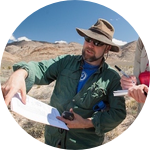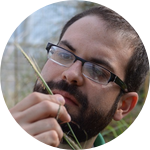About This Project
Joshua trees are perhaps the strangest plants in the world. Their long, spindly branches form twisted candelabras that have become an iconic image of the western American landscape. Ecological modeling suggests that global warming could drive Joshua trees to extinction. We propose to sequence the Joshua tree genome. This powerful research tool will help identify genes that have allowed Joshua trees to adapt to desert environments, and which could help them survive climate change.
Ask the Scientists
Join The DiscussionWhat is the context of this research?
A keystone species of the Mojave Desert, Joshua trees provide habitat for many other species, and there are numerous state and National Parks dedicated to their preservation. Unfortunately, ecological modeling suggests that, due to global warming, many populations are likely to go extinct.
Recent advances in DNA sequencing technology have made it possible to cheaply and efficiently generate genome sequence data. This makes it possible to explore the genetic bases of many features in many different organisms. We will use the Joshua tree genome to identify genes that allow Joshua trees to survive extreme environments. This will inform management strategies to help Joshua tree populations persist in the the face of climate change.
What is the significance of this project?
The Mojave Desert contains the hottest and driest regions of North America. To survive in these inhospitable environments, Joshua trees have developed many physiological adaptations. Sequencing the Joshua tree genome will reveal the genetic basis of these adaptations, and identify strains that may allow Joshua trees to adapt to climate change.
Also, Joshua trees rely on yucca moths for pollination. The moths actively pollinate the trees and lay eggs in the flowers. The eggs become caterpillars that eat some of the seeds. So, the trees pay for pollination by sacrificing seeds to the moths’ larvae. Joshua tree flowers are adapted to promote pollination while limiting the number of seeds that get eaten. Sequencing the genome will identify genes involved in coevolution with yucca moths.
What are the goals of the project?
This project is the first stage in an effort to completely sequence the Joshua tree genome. Ultimately we hope to produce a completed, assembled and annotated reference genome sequence. This phase of the project will involve shotgun sequencing on an Illumina HiSeq platform. This process will produce about 700 million snippets of DNA sequence data. These data will provide useful baseline information about the Joshua tree genome, such as the total amount of genetic variation (heterozygosity), and how much of the genome is composed of large repetitive regions. The data will also be used to complement sequencing to be generated in the next phases of the project, which will involve PacBio sequencing, BioNano optical mapping, and reference based annotation using RNA-seq.
Budget
This project represents the first stage in an effort to completely sequence the Joshua tree genome.
The initial phase involves two steps: library preparation and whole genome sequencing and analysis. We will extract DNA from leaves collected from a single Joshua tree, and prepare whole genome sequencing libraries. This involves fragmentation of the DNA and ligation of special ‘adapters’, bits of synthetic DNA, to the Joshua tree DNA for amplification and sequencing on the Illumina HiSeq 2500 platform.
This initial stage of the project will produce about 105 billion bases of sequence data, enough to read the Joshua tree genome about 35 times over (~35X coverage). These data will tell us about the complexity of the Joshua tree genome, and allow us to characterize repeat content, gene copy number variation, and genetic variation in the genome. This will pave the way for full assembly of a reference genome using PacBio sequencing, BioNano optical mapping and genetic mapping technologies.
Endorsed by
Meet the Team
Affiliates
Christopher Irwin Smith
I am an Evolutionary Ecologist and Associate Professor at Willamette University. I am interested in coevolution and the biology of desert ecosystems. I am particularly interested in the conservation and ecology of the Joshua tree.
Jeremy B. Yoder
I study evolutionary ecology, population genetics and genomics, and the origins of biodiversity.
Jim Leebens-Mack
I use genomic, phylogenetic and experimental analyses to investigate the genetic and ecology processes that influence diversification. I am especially interested in phylogenomic approaches to explore the ecological, genetic and developmental processes that contribute to the evolution of reproductive characters in flowering plants, including Joshua tree.
Michael R. McKain
I am a Postdoctoral Associate at the Donald Danforth Plant Science Center, studying the effects of polyploidy on the evolution of economically and ecologically important grasses. My research also looks at the role of polyploidy in the evolution of genome structure in plant species from yuccas to orchids.
Project Backers
- 325Backers
- 124%Funded
- $10,643Total Donations
- $26.59Average Donation










